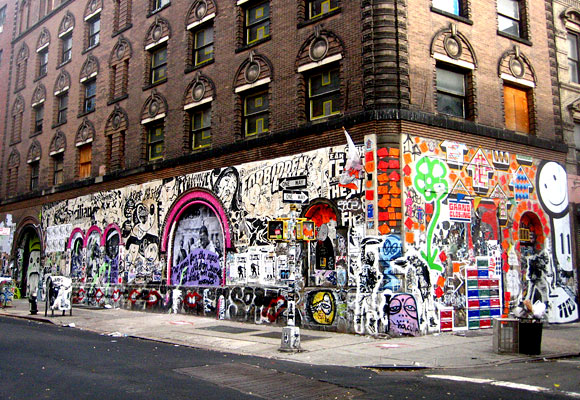Hip hop graffiti began in New York City in the early 1970's when artists would "bomb" a subway with their logo and street, letting everyone know who it was that did it. Over time the art form developed into a full fledged member of the hip hop community, along with rapping, DJing and breakdancing, all of which are called elements. During this period, graffiti artists would attempt to outdo each other by creating more pieces in the least amount of time. They would blanket all five boroughs of New York (known as going "all city") with their graffiti. This period of time was known as the "Style Wars" from which the popular film derived its name.
The hip hop graffiti artists began working collectively, both in order to evade police and build larger, more complex pieces. Groups were known as "crews" (just like in other elements of hip hop) and soon began experimenting with different styles, such as bubble lettering and the inclusion of names. Initially, permanent markers were used for the insides of trains, though spray paint soon became the most popular method for coating the exterior. Not only were they easy to conceal, spray paint cans also allowed artists to put up new pieces quickly; thus spreading their name while evading the Transit Authority. In addition to adding their signatures, graffiti artists storve to outdo each other by incorporating different colors and techniques.









New York officials did not take graffiti seriously until these Style Wars began, mostly due to a lack of funds. In the early 1980's however, the Mass Transit Authority made a go at cleaning up its trains and subways, which in essence dispirited many aspiring graffiti artists. While you cannot see much graffiti on trains anymore, it's possible to see some of the art on city buildings in major cities.
Hip hop graffiti was not lost upon the art world, however. In 1979, graffiti pioneers Lee Quinones and Fab 5 Freddy presented their work in a Roman art gallery owned by Claudio Bruni.
Hip Hop Graffiti was introduced to the world through its close association with hip hop in general. For example, it is featured in countless rap videos in the mid to late 1980's, and featured prominently in the opening scene of "The Fresh Prince of Bel Aire." As other elements of hip hop such as rap grew in popularity, so did graffiti. Two influential films at the time, "Style Wars" and "Wild Style" effectively introduced graffiti to the world.